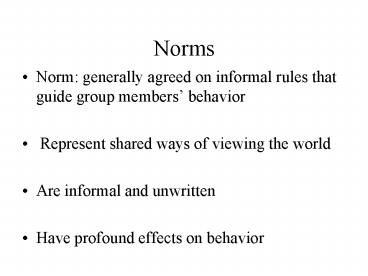Norms - PowerPoint PPT Presentation
1 / 7
Title:
Norms
Description:
Norms. Norm: generally agreed on informal rules that guide group ... Casual roles vs. tasks assigned to each? How to avoid groupthink and social loafing? ... – PowerPoint PPT presentation
Number of Views:42
Avg rating:3.0/5.0
Title: Norms
1
Norms
- Norm generally agreed on informal rules that
guide group members behavior - Represent shared ways of viewing the world
- Are informal and unwritten
- Have profound effects on behavior
2
Norm Development
- Basis of Development Example
- 1. Precedents set over Seating locations
- time
- 2. Carryovers from Standards of conduct
- other situations
- 3. Explicit statements Thats how we do it
- from others here
- 4. Critical events Divulge org secret,
- secrecy norm develops
3
Maximizing Meeting Effectiveness
- Is a meeting the most appropriate means for
accomplishing the purpose? - Is work far enough along to make meeting useful?
- What level of preparation is necessary for
everyone to ensure effective team performance? - How to avoid long, rambling meetings?
4
Maximizing Meeting Effectiveness(continued)
- What kind of discussion do you want to have?
- - Unstructured? Brainstorming? Nominal Group
Technique? - How should work be allocated and reported on?
- - Change leader for each assignment?
- - Casual roles vs. tasks assigned to each?
- How to avoid groupthink and social loafing?
5
Avoiding Social Loafing
- Assign specific tasks to specific people.
- Hold people responsible for their work. Have
everyone report to group on their progress. - As a leader, express high expectations for
performance. - Rotate the role of leader.
6
Avoiding Groupthink
- All play role of critical (supportive) evaluator
- Leader does not state point of view early on
- Have subgroups or individuals develop solutions,
compare - Assign one person the role of devils advocate
- Hold second chance meetings allow people to
express doubts - Create teams diverse in background and perspective
7
Take Home Points
- Question assumptions about others behaviors
- Distinguish between isolated events and patterns
of behavior - Recognize the positive and negative aspects of
the potential solutions to group conflict - Establish effective norms to prevent problems
- Distinguish between symptoms and underlying causes





![[DOWNLOAD]⚡️PDF✔️ Norms and Necessity PowerPoint PPT Presentation](https://s3.amazonaws.com/images.powershow.com/10038284.th0.jpg?_=20240524035)



![read [pdf] Breaking the Marriage Idol: Reconstructing Our Cultural and Spiritual Norms PowerPoint PPT Presentation](https://s3.amazonaws.com/images.powershow.com/10038446.th0.jpg?_=202405240611)

![[PDF⚡READ❤ONLINE] Breaking the Marriage Idol: Reconstructing Our Cultural and Spiritual Norms PowerPoint PPT Presentation](https://s3.amazonaws.com/images.powershow.com/10041178.th0.jpg?_=20240529124)



















